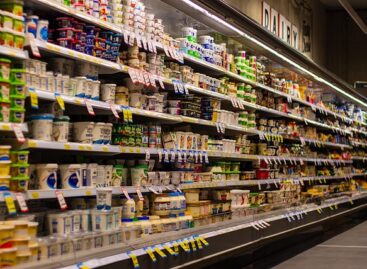NielsenIQ: not so gloomy prospects for emerging brands in 2023
Inflation and the cost of living
According to NielsenIQ’s latest Hungarian consumer survey, in the past few months a large part of respondents were spending more on FMCG products than before, as products became more expensive. What is more, from the end of summer shoppers started buying cheaper products instead of some of their usual groceries and drugs. We can see it from the NielsenIQ retail index that in the 2nd quarter of 2022 FMCG volume sales still grew by 1%, while the price increase was 16%; in the 3rd quarter prices elevated by 25% and volume sales dropped 3 %.
Based on its monthly consumer research, NielsenIQ has identified four key consumer strategies: 1. fewer shoppings, 2. buying cheaper products, 3. keeping track of promotions, 4. consciousness (planning, shopping list, etc.). It must be noted that the consumer reactions may differ across product categories.
Manufacturers can rely on: shrinkflation, reviewing promotions, optimising the product selection
Shrinkflation is the term used for manufacturers reducing the size of the product, while keeping its price the same or even increasing it a little. This practice is used all over the world and due to the fact that consumers perceive it to be less bad than rising prices, it will be frequent in 2023 too. Promotion campaigns and price discounts will remain frequent in 2023, because brands want to make sure that their revenues don’t shrink – people like to save money by buying in promotion. Still, between October 2021 and November 2022 the proportion of sales in promotion decreased in Hungary, from 45% in the base period to 41%. At the same time value sales of private label (PL) groceries and drugs were growing more dynamically than branded product sales: PL sales increased by more than 20% in both products categories, while sales of branded food products augmented by 14% and drug product sales improved by 15%.
The popularity of green consumption is growing and according to research by NielsenIQ in Hungary in 2021 and 2022, half of consumers check the product ingredients and their sources on certain products. It is important for more than three quarters of Hungarian consumers to purchase products that are made using sustainable farming practices or produced from sustainable ingredients. This is especially true for the fruit and vegetables, meat and dairy products. However, for most of the respondents this is just something that they do from time to time, and not a routine behaviour. The proportion of Hungarians who regularly buy sustainable products in these categories is 15-16% at the moment.
Growing omnichannel sales
Between 2020 and 2022 there were drastic changes in consumer behaviour, as shoppers got used to direct-to-consumer (DTC), online and omnichannel shopping. NielsenIQ’s 2022 Shopper Trends report found that nearly one fifth of respondents had bought FMCG products online in the previous one month. The NielsenIQ E-commerce Index revealed that online’s share in the FMCG categories that are audited by NielsenIQ was a little above 1% in December 2021-November 2022.
Omnichannel shopping is a growing trend at global level: 86% of shoppers combine online shopping with buying in physical stores, and only 14% buy in brick-and-mortar stores only. Having an insight into omnichannel consumer behaviour can help brands to learn where and when shoppers are making changes, to which companies can then react by modifying online pricing or promotions, and by positioning their products better in the online “shop window” of their e-commerce partner. Brands can strengthen their multichannel sales activities in a pro-active fashion.
Important omnichannel strategies
1. Highlighting relevant product characteristics: those brands that can identify which product characteristics (e.g. bio, plant-based, etc.) are the most important to indicate on the packaging and on product lists, will appear more frequently in online product searches and therefore are more likely to be sold.
2. Branding should be consistent: irrespective of the given retail channel, it is the brand through which consumers connect the product with the manufacturer. It is key to give the brand a consistent presence in every channel, and at the same time to stand out from the crowd on the shelf and in the online shop too.
3. Using social media: as brands are trying to reach consumers in new ways, social media use is becoming more and more important in e-commerce. A recent study bay Dash Hudson and NielsenIQ has made it clear: there is direct correlation between entertaining TikTok content and the omnichannel sales growth of beauty products in the USA.
The recipe of success in 2023
1. Continuous revenue management: in order to remain profitable and keep retail spending efficient in all conditions, revenue managers always need to work with the latest data, which reflect the actual dynamics of the market.
2. Exploiting the opportunities of omnichannel: today’s shoppers move more freely between retailers and channels than before. FMCG brands have to understand their buyers if they want to know what to focus on for getting their attention.
3. Being credible: shoppers – especially young consumers – want brands to be completely honest about who they are. In 2023 the key will be honesty for brands, and transparency can also contribute to building brand loyalty and reinforcing the positions of a brand.
4. Agility brings good performance: as the market is going through numerous changes, brands must react quickly and confidently. This agility can pay off, as 57% of businesses that perform well tend to be more likely to modify their long-term strategies – relying on data and analytics – than their competitors.
5. Data and insights are essential: preparing an efficient growth strategy depends very much on having access to the latest accurate data, and on understanding how these can contribute to the growth of a company. //
This article is available for reading in Trade magazin 2023.2-3.
Related news
Discover the solutions of the future on Startup Island! (Part 1)
🎧 Hallgasd a cikket: Lejátszás Szünet Folytatás Leállítás Nyelv: Auto…
Read more >The place of Hungarian products in stores is in danger
🎧 Hallgasd a cikket: Lejátszás Szünet Folytatás Leállítás Nyelv: Auto…
Read more >Related news
How Coca-Cola plans to build more billion-dollar brands
🎧 Hallgasd a cikket: Lejátszás Szünet Folytatás Leállítás Nyelv: Auto…
Read more >Tesco sets out store expansion plans in 2026 including five former Amazon Fresh sites
🎧 Hallgasd a cikket: Lejátszás Szünet Folytatás Leállítás Nyelv: Auto…
Read more >









